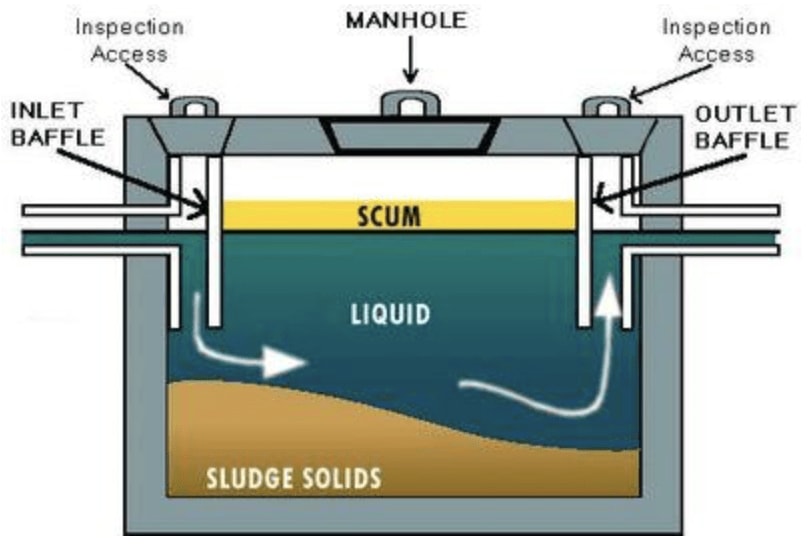
One of the most common questions we hear from our buyers looking outside the city is “Are septic systems hard to maintain?”
Having to take care of your septic system may seem like a daunting task. There is a lot at stake. If maintenance isn’t correctly done then you can end up with costly repairs or disgusting sewage problems, so we are here to help you avoid these pitfalls. We’ve gotten with Dave Tolley of Tolley Enterprises, to help give you the “Do’s and Don’ts” of maintaining your septic system. First, you want to educate yourself on how septic systems function, so you have a better understanding of why certain things are suggested. Take a little time and do your research, then you will see that taking proper care of your septic system is important, but also quite easy! To help you ensure your system remains working the way it was intended, we’ve put together a complete list of the “Do’s and Don’ts” of caring for a septic system. Here are some tips to keep your system running at its finest.
The Do’s
Do: Have Your System Pumped Regularly
Your septic tank is nothing more than a separation chamber, not the holding tank that some customers believe it to be. Once your septic tank reaches its operating level (elevation of the outlet pipe), it remains the same. When in proper working condition, your tank separates the solids from the liquids via two baffles. The inlet baffle is meant to disperse the wastewater as it enters the tank from the facilities in your home. The outlet baffle that feeds your filtration system, is designed to draw the cleanest liquid from the middle of the tank where it is the least polluted with solids. As time goes on, the bottom and top layers of solids (sludge and scum) begin to grow towards each other until the outlet baffle begins to allow the solids to make their way to the filtration system where they will cause a layer of sludge to form and reduce the filtration area and lifespan of your system. By keeping the solids pumped out of the tank, the outlet baffle will be able to maintain the flow of only the cleanest liquid to your filtration system and keep your system in proper working order. (Source: Tolly Enterprises)

Do: Have Your System Inspected Frequently
It is important to inspect your septic tank regularly to see where waste levels are in the tank. If a tank is allowed to overfill, waste will begin backing up into your plumbing, and (eventually) into your home! As you can see, it is important to check that your septic system is functioning properly. Tolley Enterprises will work closely with real estate agencies to provide inspections of septic systems to protect all parties involved in each real estate transaction. Whether working for the buyer or seller, they provide a full and thorough inspection by their certification through the Maryland Onsite Wastewater Professionals Agency (MOWPA). They take pride in providing an accurate evaluation of your system that they believe surpasses that of other companies. Give them a call and they’ll be happy to explain why. (Source: Tolly Enterprises)
Do: Know and Mark Where Your Septic Lid is Found
Often, septic lids can be buried between 4 inches and 4 feet underground. Knowing where your lid is, will assist in pumping the tank without unnecessarily needing to tear up your yard. The best thing to do is to bring the tank opening above grade.
Do: Spread Out Water Usage
We know laundry can get backed up and we want to do it all to catch up, but it is better to keep it spread out. It is important to give the bacteria in your tank the time it needs to break down waste and drain out excess wastewater. If the tank is overwhelmed, the water can back up, making a messy situation and more of a hassle for you. So, it’s important to take it easy with water usage and give your tank the time it needs to do its job.
The Don’ts
Don’t Use Antibacterial Products or Harsh Cleaning Agents!
These products kill bacteria and ultimately you want the good bacteria to thrive inside your septic system. Toilet paper and waste cannot be broken down without the proper bacteria, which can lead to clogs and backups for you. A little bleach is ok but keeps it minimal.
Don’t Pour Toxins Down the Drain!
Going back to educating on how the system works, the septic system is merely just a separation chamber. Ultimately, these toxins could potentially end up back in your drinking water!
Don’t Flush Anything Other Than Human Waste and Toilet Paper!
We know it is convenient to flush things that seem harmless, but flushing anything other than human waste and toilet paper can harm your septic system and create a major hassle for you. The fact is that, while toilet paper and waste get broken down quickly by the bacteria in your holding tank, other things won’t break down as quickly or at all, creating clogs.
Don’t Drive or Park Vehicles or Build Structures on Your Leach Field!
Your leach field is a system of buried lateral lines (PVC pipes) that help to drain out liquid from your septic tank. These lines aren’t buried very deep, and heavy vehicles/structures can damage your septic system by either collapsing your lateral lines or condensing the soil around them until wastewater can’t properly disperse into the ground.
Don’t Plant Trees or Shrubs on Your Leach Field!
Planting trees and shrubs in your leach field can damage your lateral line system. The roots of trees and shrubs go deeper and are stronger than grass, and they can break lateral lines.
Don’t Use a Garbage Disposal or Pour Food Waste (Particularly Greases) Down the Drain!
It is ok to use a garbage disposal if you are on a septic system, however, you will need to pump more frequently. The more solid waste you add the more often you’ll need to pump. I would advise you to throw the big food chunks in the compost or garbage.
Grease is another issue because it can accumulate inside your pipes and septic tank. The grease will accumulate and items like hair or debris will get caught in the grease, eventually building up enough to reduce water flow through your lines.
We hope that this list of the septic system “Do’s and Don’ts” has helped you!




